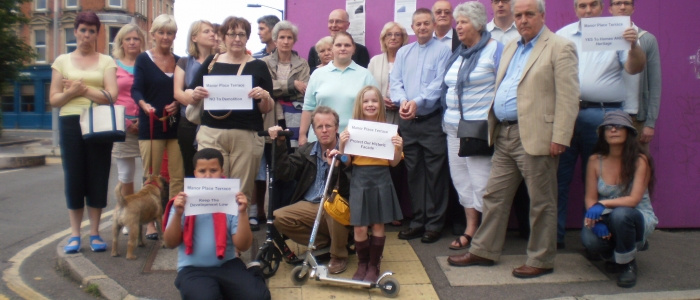
Protest picture for the local newspaper
Forming a local society
 By Jeremy Leach
Published 14 December, 2012
By Jeremy Leach
Published 14 December, 2012
Jeremy Leach is Chair of the Walworth Society.
There are three main elements to setting up a local group. The main one is obviously a reason or cause; secondly there is the need to reach out to those who might be interested. Thirdly there are the nuts and bolts of establishing and then running a group.
The Cause
Most often it is a single issue or cause that brings people together either to make something happen or stop it happening. The threatened loss of a much loved building or valued green or open space can draw together the most diverse and surprising groups of people to become organised.
While individuals struggle to be heard, the formation of a group and the synergies it brings can help ensure that what is created vastly exceeds the sum of its parts.
The cause for which you are fighting will almost certainly dictate the breadth of the purpose for which the group is set up. It is far easier to gain immediate interest in a Friends Of…or Save The… group as the purpose can be instantly communicated. A single issue can generate enormous but relatively focused energy and commitment. A few people can set up and manage a single issue campaign. Once that issue is finished, however, what will become of the group?
Establishing an area-based Society allows a far greater range of issues to be tackled. To be successful, however, a larger number of people who are prepared to take on a range of tasks is needed. More people are required and they need to know that they will need to work steadily over a long period of time. If this commitment does not exist, energy will soon dissipate and the society will fail.
In reality, battles are the lifeblood of local groups. The key is of course to pick those that a) are of sufficient importance to be worth the effort (and at the outset have at least some prospect of a positive result) and b) command interest and support from local people.
Gaining Support
Armed with a worthwhile cause, the group needs to gain support either for the cause itself or for members. In terms of people there are three main types of support that are needed. Firstly there are the people who will do things and be actively involved (eg committee members). Secondly there are people who will come to things when specifically asked (e.g. a planning committee meeting). Thirdly (and obviously this is the largest group) who will give their name to the society (eg sign a petition or be members) but have no other involvement.
To succeed, a local society will need to bring together support in three main areas:
- First and foremost amongst local people and other community groups.
- Secondly with the local authority. Initially this might be principally forming relationships with local representatives in the form of local councillors but ideally, in time, relationships will be formed with council officers wherever that is possible.
- Through (local) media. Obviously this is far more fragmented than it was even a decade ago with the arrival of social media but key will be local newspapers, local online forums, local news websites, the creation of the society's own website/Facebook page/Twitter account.
The following is a non-definitive list (in no particular order) of ways a society can gain support (either for the society itself or for a principal cause):
- Petition - online and paper (try to collect email addresses and ensure people are agreeing to be contacted).
- Articles in and letters to local newspapers.
- Setting up a website/Facebook page/Twitter account.
- Action days - extremely useful tool both to raise interest but also, if a focal point in the day can be created, to encourage local media and local politicians to attend.
- Handing out leaflets.
- Attending and speaking at community and Council meetings.
- Meeting with local councillors.
- Surveys which can demonstrate interest in and support for the cause.
- Postings on local online forums.
- Making links with other local community groups.
- Attending local events (e.g. with a trestle table).
The Mechanics
Finally you need to consider how the group is run. Although a non- constituted group can be effective, to gain traction at the very least with the local council, it will probably be necessary to become formally constituted.
Becoming Constituted – you will need:
- An adopted constitution. There are an infinite variety of constitutions but probably the big difference is between one for a single issue group and for a more widely-based society.
- Elected officers and committee. You will need a Chair, Secretary and Treasurer (whether or not you open a bank account)
- To hold meetings and at the very least an annual general meeting.
As well as being constituted you will need to do the following as a minimum:
- Have a website and a contact e-mail address.
- Create and circulate an agenda ahead of meetings; take and circulate minutes afterwards.
- To be able to manage an email list/membership list.
If you plan to be a membership-based organisation, you will need to decide whether members pay a fee and if so you need systems to collect the membership fees, remind about renewals and a bank account.